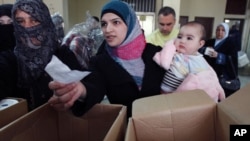The United Nations High Commissioner for Refugees say at least 9,000 Syrians have fled into Lebanon since the Syrian government began a bloody crackdown on anti-government protests last year.
UNHCR spokeswoman Dana Suleiman in Beirut tells VOA that the U.N. refugee agency and the Lebanese government have calculated that more than 7,000 have crossed into Lebanon since last April. At least 2,000 additional Syrians fled across the border in the Bekaa Valley in recent days to escape the violence from the Homs region.
An opposition group, the Britain-based Syrian Observatory for Human Rights, says Syrian forces Tuesday bombed a bridge used to evacuate the wounded from Homs.
Another activist group, the Syrian Local Coordination Committee, says government forces shelled Maaret al-Numan in northwestern Idlib province. Witnesses reported large explosions and cut communication lines in the Daraa region.
Syria's state-run news agency, SANA, quoted President Bashar al-Assad Tuesday saying Syrians have proved their determination to pursue reform and to fight "foreign-backed terrorism," which the Syrian government blames for the nearly year-long unrest.
On the diplomatic front, the White House said Tuesday that the Obama administration remains committed to a diplomatic and political approach to the crisis in Syria rather than military intervention.
White House spokesman Tommy Vietor said Tuesday the administration believes isolating the regime and pushing the opposition to unite is the best way to usher in a political transition.
The comments come a day after top U.S. Senator John McCain said the U.S. should lead an international airstrike on Syrian forces in order to create and defend safe havens for the opposition to plan political and military activities.
Middle East analyst Stephen Zunes told VOA that McCain's strategy for international intervention would benefit the Mr. Assad's government.
"Clearly there needs to be international pressure to enable humanitarian goods to get in, however military intervention would just justify greater brutality by the Syrian regime. And further, armed resistance gives the regime an excuse to open up its firepower even more on these crowded urban areas, which would lead to even greater civilian casualties."
China's former ambassador to Syria is traveling to Damascus for talks on a political solution to the crisis. The Syrian government has also agreed to visits this week from former U.N. secretary-general Kofi Annan, the new special envoy to Syria, and U.N. humanitarian chief Valerie Amos.
Annan goes to Damascus Saturday and Amos said she will arrive in the capital on Wednesday. She said she will urge "all parties" to give aid workers "unhindered access" in delivering supplies to people affected by the violence and evacuating the wounded.
The United Nations estimates that violence linked to the uprising has killed at least 7,500 people since it began last March. Syria blames the unrest on "armed terrorist groups" backed by foreign conspirators.
Britain's Channel 4 aired footage Monday of Syrians reportedly being tortured by medical staff in state-run hospitals in Homs. The U.N. human rights chief Navi Pillay says the agency has evidence of torture also occurring in hospitals in Hama and Darra.
Syrians braved freezing temperatures and Syrian army patrols to flee into Lebanon in recent days. They say they feared being slaughtered by Syrian forces who are continuing a brutal offensive against anti-government rebels in and the around the city of Homs.
Some information for this report was provided by AP and Reuters.




